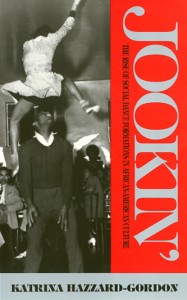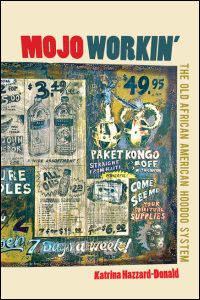Known as one of the nation’s leading dance researchers, Katrina Hazzard-Donald,Ph.D., author, lecturer and professor is the author of two scholarly books and numerous articles on African-American dance and culture and one book of poetry. She is in wide demand as a guest speaker at Universities and Colleges around the world. She recently delivered the 2020 Keynote address at Duke University’s CADD (Collegium for African Diaspora Dance) Symposium in which she encouraged young researchers to do more than write about dance. She challenged them to reexamine the scholarly paradigms that they use when researching dance and to submerge themselves in the “dance life and culture” of their subjects and allow that material and experience to positively influence the direction of their research.
 Her first book, Jookin’: The Rise of Social Dance Formations in African American Culture (Temple University Press), won the De La Torre Bueno Special Citation for Dance Research. Her second book, Mojo Workin’: The Old African American Hoodoo System. (University of Illinois Press), explores and sets forth a new theory of the Ring Shout. An Ogun Olorisha, or initiate to Ogun in the New World Yoruba/Lukumi tradition, Dr. Hazzard-Donald interviewed and worked with traditional African American Hoodoo workers for her second book. In addition to the books, she is the author of a number of articles in journals, anthologies and encyclopedias that explore the meaning, function and nature of African American Dance. She is the recipient of an American Council of Learned Societies Fellowship, A Rockefeller Postdoctoral Fellowship at Brown university and the 1999 Oni Award from the International Black Women’s Congress. She served as Guest Curator/Historian for the National Afro-American Museum’s 1999 exhibit “When The Spirit Moves: African American Dance in the United States.” She was a major voice in the both the Emmy nominated Public Broadcasting video “Swing, Bop and Hand Dance” and the Emmy Award winning video documentary “The Teenarama Dance Party, as well as the Lincoln Center production “Free to Dance,” airing on public broadcasting channels around the nation. In the 1960’s she worked for Delta Ministry in the Bolivar County, Mississippi Delta towns of Greenville, Cleveland and Glen Allen, Mississippi. In the early 1970’s she taught at the now legendary though defunct “Street Academy” Projects which, after the success of Harlem Prep, sprang up in major cities across the United States. .
Her first book, Jookin’: The Rise of Social Dance Formations in African American Culture (Temple University Press), won the De La Torre Bueno Special Citation for Dance Research. Her second book, Mojo Workin’: The Old African American Hoodoo System. (University of Illinois Press), explores and sets forth a new theory of the Ring Shout. An Ogun Olorisha, or initiate to Ogun in the New World Yoruba/Lukumi tradition, Dr. Hazzard-Donald interviewed and worked with traditional African American Hoodoo workers for her second book. In addition to the books, she is the author of a number of articles in journals, anthologies and encyclopedias that explore the meaning, function and nature of African American Dance. She is the recipient of an American Council of Learned Societies Fellowship, A Rockefeller Postdoctoral Fellowship at Brown university and the 1999 Oni Award from the International Black Women’s Congress. She served as Guest Curator/Historian for the National Afro-American Museum’s 1999 exhibit “When The Spirit Moves: African American Dance in the United States.” She was a major voice in the both the Emmy nominated Public Broadcasting video “Swing, Bop and Hand Dance” and the Emmy Award winning video documentary “The Teenarama Dance Party, as well as the Lincoln Center production “Free to Dance,” airing on public broadcasting channels around the nation. In the 1960’s she worked for Delta Ministry in the Bolivar County, Mississippi Delta towns of Greenville, Cleveland and Glen Allen, Mississippi. In the early 1970’s she taught at the now legendary though defunct “Street Academy” Projects which, after the success of Harlem Prep, sprang up in major cities across the United States. .

Professor Hazzard-Donald became interested in African traditional religion as a result of her involvement in studying and performing traditional African dance. Traditional African religions utilize dancing as a form of religious expression during worship. In the process of studying and practicing African traditional dance she observed many similarities in how traditional African religions approach human existence, problems and concerns, and that body of practices known to African Americans as Hoodoo, Conjure or simply as “Root Work.” Examining those similarities led to the research that went into the second book. She has presented her work at scholarly conferences, invited panels, lectures and in keynote addresses. She is currently pursuing two projects: one which seeks to explore the relationship between Jazz Scat singing, Pentecostal Holiness speaking in Tongues, and Turntable Scratching; the second examines the famous but now forgotten “June German Dances” of Rocky Mount, North Carolina which drew upwards of 25,000 African American participants from as far away as Texas and Massachusetts to a North Carolina Tobacco Barn.
Professor Hazzard-Donald currently teaches Race & Ethnicity, Contemporary Social Problems, Sociology of Jazz, African American Culture, The Sociology of W.E.B. DuBois, Dance of the African Diaspora, and Dance Movement for the Theater. Widowed, professor Hazzard-Donald currently lives in Philadelphia with her daughter, brother and pet cat. E-mail Dr. Hazzard-Donald